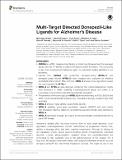Multi-target directed donepezil-like ligands for Alzheimer's disease
Abstract
Highlights -ASS234 is a MTDL compound containing a moiety from Donepezil and the propargyl group from the PF 9601N, a potent and selective MAO B inhibitor. This compound is the most advanced anti-Alzheimer agent for preclinical studies identified in our laboratory. -Derived from ASS234 both multipotent donepezil-indolyl ( MTDL-1 ) and donepezil-pyridyl hybrids ( MTDL-2 ) were designed and evaluated as inhibitors of AChE/BuChE and both MAO isoforms. MTDL-2 showed more high affinity toward the four enzymes than MTDL-1 . -MTDL-3 and MTDL-4 , were designed containing the N-benzylpiperidinium moiety from Donepezil, a metal- chelating 8-hydroxyquinoline group and linked to a N-propargyl core and they were pharmacologically evaluated. -The presence of the cyano group in MTDL-3 , enhanced binding to AChE, BuChE and MAO A. It showed antioxidant behavior and it was able to strongly complex Cu(II), Zn(II) and Fe(III). - MTDL-4 showed higher affinity toward AChE, BuChE. - MTDL-3 exhibited good brain penetration capacity (ADMET) and less toxicity than Donepezil. Memory deficits in scopolamine-lesioned animals were restored by MTDL-3 . - MTDL-3 particularly emerged as a ligand showing remarkable potential benefits for its use in AD therapy. Alzheimer's disease (AD), the most common form of adult onset dementia, is an age-related neurodegenerative disorder characterized by progressive memory loss, decline in language skills, and other cognitive impairments. Although its etiology is not completely known, several factors including deficits of acetylcholine, β-amyloid deposits, τ-protein phosphorylation, oxidative stress, and neuroinflammation are considered to play significant roles in the pathophysiology of this disease. For a long time, AD patients have been treated with acetylcholinesterase inhibitors such as donepezil (Aricept®) but with limited therapeutic success. This might be due to the complex multifactorial nature of AD, a fact that has prompted the design of new Multi-Target-Directed Ligands (MTDL) based on the “one molecule, multiple targets” paradigm. Thus, in this context, different series of novel multifunctional molecules with antioxidant, anti-amyloid, anti-inflammatory, and metal-chelating properties able to interact with multiple enzymes of therapeutic interest in AD pathology including acetylcholinesterase, butyrylcholinesterase, and monoamine oxidases A and B have been designed and assessed biologically. This review describes the multiple targets, the design rationale and an in-house MTDL library, bearing the N-benzylpiperidine motif present in donepezil, linked to different heterocyclic ring systems (indole, pyridine, or 8-hydroxyquinoline) with special emphasis on compound ASS234 , an N-propargylindole derivative. The description of the in vitro biological properties of the compounds and discussion of the corresponding structure-activity-relationships allows us to highlight new issues for the identification of more efficient MTDL for use in AD therapy.
Citation
Unzeta , M , Esteban , G , Bolea , I , Fogel , W A , Ramsay , R R , Youdim , M B H , Tipton , K F & Marco-Contelles , J 2016 , ' Multi-target directed donepezil-like ligands for Alzheimer's disease ' , Frontiers in Neuroscience , vol. 10 , 205 . https://doi.org/10.3389/fnins.2016.00205
Publication
Frontiers in Neuroscience
Status
Peer reviewed
ISSN
1662-453XType
Journal item
Rights
Copyright © 2016 Unzeta, Esteban, Bolea, Fogel, Ramsay, Youdim, Tipton and Marco-Contelles. This is an open-access article distributed under the terms of the Creative Commons Attribution License (CC BY). The use, distribution or reproduction in other forums is permitted, provided the original author(s) or licensor are credited and that the original publication in this journal is cited, in accordance with accepted academic practice. No use, distribution or reproduction is permitted which does not comply with these terms.
Description
MU, GE, JM thank to MIneco (Spain) for support Grant SAF 2012-33304, SAF 2015-65586R. All authors thank EU COST Action CM1103 for its support.Collections
Items in the St Andrews Research Repository are protected by copyright, with all rights reserved, unless otherwise indicated.

